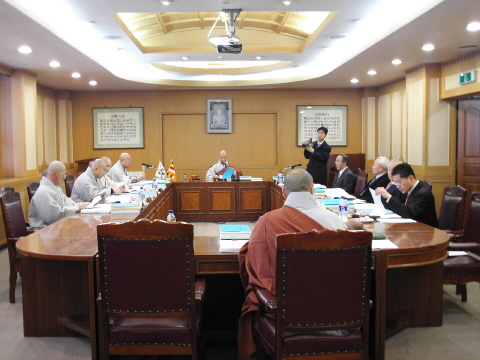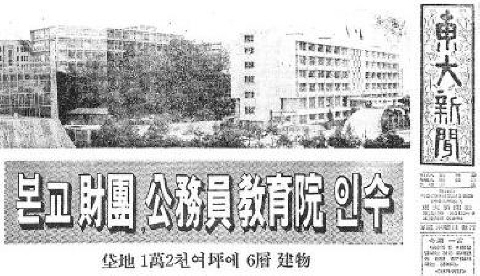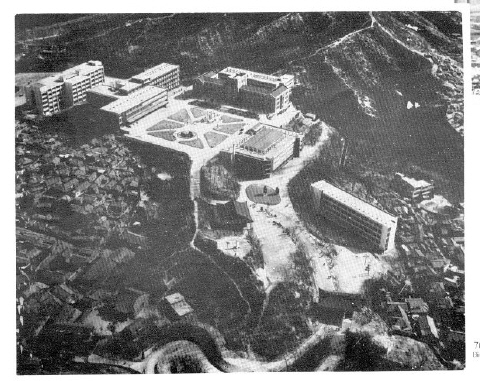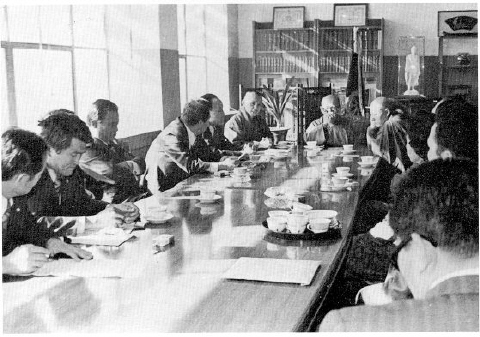모두의 이익을 위한 ‘윈윈전략’ 절실해
특별기고 - 동국대 재단의 발전적 쇄신을 위한 제언
동국대학교는 조계종단과 야 뗄 수 없는 관계임에 분명하다. 동국대학교는 조계종의 전신이라 할 수 있는 17개 사찰의 삼보정재를 출연받아 설립된 종립학교이기 때문이다.
그러나 언제부터인가 동국대와 조계종은 서로에게 발전이 되는 존재이기 보다는 서로의 이해관계에 따라 갈등을 거듭하는 애증의 관계가 되어 버렸다. 학교는 더 이상의 투자에 인색한 종단에 불만을 갖게 됐고, 종단은 학교를 종단정치의 일부로 만들어 버렸다.
이러한 관계는 지난 수십년간 계속되오고 있으나 해결의 실마리를 찾지 못하고 있는 것이 사실이다. 이에 신정아사건을 계기로 동국대학교와 조계종단의 관계를 근원적으로 성찰하고 재단쇄신의 바람직한 방향을 발전적으로 모색해 본다. 편집자
조계종 전국교구본사 주지스님들이 지난 10월 5일 긴급회의를 열고, 소위 ‘신정아 사건’과 관련하여 동국대 재단이사들과 종단 총무원 관계자들의 책임을 묻고 강력한 자정의지를 밝히면서 조선일보 불매운동을 결의했다. 그리고 조계종 중앙신도회도 지난 4일에 검찰, 언론, 그리고 정치권의 각성을 촉구하는 성명을 발표했다.

신정아 가짜학위사건은 종립 동국대 재단이사를 맡고 있으면서 현 종단 핵심지도부의 일원인 장윤 스님이 의혹을 제기하면서 불거지기 시작했다.
뿐만 아니라 장윤 스님은 정부고위관료 중에 가장 불교계와 우호적인 관계를 유지했던 청와대 정책실장이 연루되어 있다는 말을 언론에 흘리면서 결국 온 나라를 떠들썩하게 만들었다. 그리고 동국대 뿐만 아니라 불교계 전체가 언론에 의해 매도당하는 지경이 되었다.
결과적으로 언론과 검찰, 그리고 정치권에서 이번 사건을 부풀리고 왜곡시키며 악용하였다 하더라도, 이 사건이 불교계 전체를 위기와 분노에 휩싸이게 만든 일차적 책임은 종립대학과 불교계 내부에 있었음을 우리는 통렬히 반성하지 않을 수 없다.
앞으로 이 사건과 관련하여 학교는 그 책임의 소재를 명확히 밝히고 대학의 교수채용과 학위검증시스템이 더욱 공정하고 투명하게 운영되도록 해야 한다.
그러나 무엇보다도 이번 사건은 종단과 동국대의 특수한 관계 속에서 오랫동안 누적된 갈등과 반목에서 출발되었다는 사실을 주목해야 한다.
종단과 동국대의 관계형성 과정
개화기인 1906년, 근대적인 승가교육의 필요성을 절감했던 불교계에서 전국의 17개 사찰이 정재를 출연하여 명진학교를 설립했다.
명진학교를 시원으로 우리나라 굴지의 종합대학으로 성장한 동국대의 건학이념과 물적 기반이 불교에 있음은 주지의 사실이다.
또한 일제 하에서 만해 한용운 스님을 비롯하여 동문선배들이 민족독립을 위한 투쟁으로 두 번의 강제폐교를 당하면서도 그 명맥이 유지된 바탕에는 불교정신의 힘이 있었다. 불교는 동국대의 토대이며 자랑이다. 누구도 그것을 부정할 수 없으며, 부정하지 않는다.
1952년에 한국전쟁의 와중에서 전국교구본사 주지스님들이 모여 동국대학을 명실상부한 종합대학으로 만들기 위해서 교구본사 소유 임야의 2할을 동국대의 재산으로 출연하는 것을 결의했다. 소위 “2할림(二割林)”이라는 동국대의 새로운 물적 토대가 마련된 것이다.
이를 기반으로 ‘동국대학’은 사학 최초의 종합대학인 ‘동국대학교’로 거듭나게 된다. 연세대, 고려대와 함께 소위 3대 명문사학으로 입지를 굳히게 된 것이다.

그리고 1970년에 종단은 동국대의 미래에 분수령이 되는 중대결정을 한다. 현재 코엑스, 아셈빌딩, 인터콘티네탈 호텔 등이 들어선 강남의 요지인 봉은사 앞 종단소유 토지 11만 7천여평을 서울시에 매각하고 그 대가로 장충동 일대 토지 1만 2천여평과 현 혜화관 건물인 당시 공무원교육원으로 사용하던 6층 건물을 매입하여 동국대에서 사용하도록 한 것이다.
당시 동대신문은 이 일에 대해서 “동대발전에 일대낭보”라는 제목으로 흥분된 반응을 보도했다.
그러나 매각 결정 한 달 뒤에 강남개발계획이 발표되었고 불교계에서는 정부로부터 사기를 당했다는 거센 비난이 일어나면서 소위 “봉은사 땅 매각사건”은 동국대를 둘러싼 종단분규의 계기가 되었다.

지금 시가 10조원 이상을 호가하는 그 땅을 매각한 대가로 얻은 동국대의 건물과 토지의 현재가치는 비교할 수 없을 정도로 초라하다. 뿐만 아니라 매각사건을 계기로 불거지기 시작한 동국대 재단분규는 현재까지도 그 여파를 남기고 있다.
재단이사회 구성의 핵심쟁점
명진학교 설립을 시작으로 세 번에 걸친 굵직한 불교계의 기여로 동국대 재단의 현재 물적 기반이 형성된 것은 재단 이사회가 스님이사 중심으로 운영되는 것에 정당성을 부여하는 확실한 명분과 배경이 되었다.
그러나 1979년 경주캠퍼스의 설립, 1991년 동국의료원 설립, 2004년 동국대 일산불교병원 개원 등 동국대의 굵직한 외형적인 성장의 기반은 불교계의 재정적 투자가 아니라 대부분 학교 자체의 교비투자에 의해서 이루어졌다.
교비의 주된 수입원이 학생 등록금인 것을 감안했을 때 70년대 중반 이후 동국대의 양적 성장 투자는 대부분 등록금으로 이루어진 것이라고 할 수 있다.
이것은 60년대 이후 우리나라 대다수 사립대학이 학생등록금과 함께 청강생제도, 편입생제도를 통한 편법수단으로 재정확충을 해온 것과 그 궤적을 같이 하는 것으로 동국대만의 특수한 상황과 문제는 아닐 것이다.
교비투자에 의한 대학의 외형적인 성장은 불행하게도 교육의 질적인 발전을 담보하지 못했다는 점에서 비판을 면하기 어렵다.
우수한 교수확충과 교육환경 조성에 쓰여야 할 교비가 천문학적인 재정투자가 필요한 제2캠퍼스와 병원 건립에 투입되면서 동국대는 80년대 이후 질적인 발전을 이루지 못했다는 것이 학내외의 대체로 일치된 견해다.

이러한 결과에 대해서 대학경영의 책임을 지고 있는 역대 재단 이사회는 비판받아 마땅하다. 그리고 재단 이사를 역임한 종단의 원로중진스님들 또한 그 비판으로부터 자유로울 수 없다. 그렇지만 지난 과거의 잘잘못을 가려 그 책임을 지금 추궁하는 것은 바람직하지 않다.
그러나 과거의 잘못이 현재까지도 시정되지 못하고 현 사태와 같은 갈등과 부조리의 뿌리가 되고 있다면 문제는 달라진다.
현재 동국대 재단이사회는 학교법인 정관에 따라 “대한불교조계종 재적승려 9인, 대학의 장, 기여(其餘)는 이교도가 아닌 교육계 및 각계의 덕망 높은 인사”로 전체 13명의 이사를 두도록 규정하고 있다.
승려이사는 “조계종단의 2배수 이상 추천을 받아” 이사회에서 선임한다. 승려이사 9인은 이사정수의 3분의 2 이상을 차지함으로써 정관개정과 학교의 해산결의가 가능한 구성이다. 그동안 이러한 이사회 구성에 대해서 종립학교라는 특수성을 감안하여 특별한 문제가 제기되지는 않았다.
그러나 90년대 후반 이후에 이사 추천을 두고 조계종 종회가 몇 차례 홍역을 치루면서 종단 내부의 갈등이 소위 “동국대 문제”와 결부되는 현상이 점점 심화되고 있다.
특히 올해 11월에 상당수 이사의 임기가 만료되는 것과 맞물려 동국대 승려이사 선임은 종단갈등의 핵심쟁점이 되고 있다.
그리고 ‘승려이사 9인’은 현행 사립학교법의 임원선임요건에 비추어 현실적으로 이사회 구성에 상당한 문제점으로 지적되고 있다.
사립학교법에는 “이사 중 적어도 3분의 1 이상은 교육경험이 3년 이상 있는 자라야 한다”는 제한규정을 두고 있다. 또한 최근에 “이사정수의 4분의 1에 해당하는 개방이사”를 당연히 선임하도록 개정되면서 이사선임의 함수관계는 더욱 복잡해졌다. 지난 9월 종회에서 이사후보 추천이 무산된 것은 이러한 복잡한 문제와 무관하지 않다.
‘재단 쇄신’ 어떻게 할 것인가
지난 2일 동국대 재단 이사회는 신정아 사건과 관련하여 성명서를 내면서 “재단의 전면적 쇄신”을 하겠다고 밝혔다. 또한 동국대 교수회와 전국교구본사주지회의는 “재단이사 전원 사퇴”를 요구했다.
“이사 전원 사퇴” 요구와 “재단의 전면적 쇄신” 표명은 현상적으로 상응하는 모습으로 비춰질 수 있다. 현 이사회는 이번 사태와 관련하여 책임질 일에 대해서 분명히 책임지는 모습을 보여야 한다.
그와 함께 이미 약속한 재단의 전면적 쇄신을 어떻게 할 것인가에 대해서 대학 구성원은 물론 종단과 동문사회, 그리고 사회각계의 건강한 의견을 구해야 할 것이다. 이와 관련하여 재단 쇄신에 대해서 몇 가지 중요한 고려사항이 전제될 필요가 있다.
먼저 재단의 인적 쇄신이 필요하다. 그 동안 재단 운영에 있어서 갈등의 원인을 제공했던 인사들은 스님이건 동문이건 상관없이 이번 기회에 책임을 지고 반드시 물러나야 한다. 그러나 현행법상으로 이사 전원 사퇴는 재단이 해산되는 최악의 사태나 또는 관할청인 교육인적자원부에 의한 임시이사 선임을 초래한다.
한 여성의 가짜학위사건으로 이러한 결과를 요구한다는 것은 결코 바람직하지 않은 주장이다. 우리는 현재 임시이사가 선임된 일부 대학들의 파행적인 운영을 냉정하게 직시해야 한다. 이사 전원이 교체된다고 해서 재단이 쇄신될 것이라고 생각하는 사람은 아무도 없다.
벌써 종단 내부에서는 차기 이사로 자천타천의 인사들이 거명되고 있다. 대학경영을 잘 모르는 일부 불교계 인사들이 재단이사가 되려고 하는 이유는 자명하다. 교계인사들에게 재단이사는 대학의 인사와 재정운영, 병원경영과 관련한 각종 이권에 직간접적으로 영향력을 행사할 수 있다는 그릇된 인식이 팽배해있다.
그런 인사들이 재단이사가 되었을 경우에 대학경영은 파행적으로 표류할 수밖에 없다. 이사 전원 교체 주장은 인적 쇄신을 강조하는 상징적인 표현으로 충분하다.
인적 쇄신과 함께 반드시 재단이사회 구성시스템에 대한 개선이 필요하다. 앞에서 서술한 바와 같이 “승려이사 9인”이라는 이사회 구성의 한정조건은 재단과 종단의 분규원인이 되고 있는 만큼 이번 기회에 반드시 개선되는 것이 바람직하다.
예를 든다면, “승려이사 5인 이상”과 같은 유연한 규정으로 정관을 개정하고, 승려이사의 추천 조건을 “종단을 대표하여 건학이념을 구현하는데 기여할 수 있는 덕망과 학식이 있는 승려”와 같이 교육기관의 운영책임을 담보할 명분 있는 내용으로 명시하는 것이 바람직하다.
그리고 무엇보다도 재단운영시스템의 획기적인 혁신이 필요하다. 동국대학교는 불교계의 어떤 조직이나 기관보다도 방대한 재정규모와 인적 구성을 갖춘 매머드 기관이다. 동국대 재단 산하기관의 연간 총예산은 총무원 예산의 거의 20배 규모다. 이제 역으로 동국대가 불교계에 기여해야 한다는 주장도 교계 일각에서 나오는 실정이다.
그러나 동국대가 처한 현실은 아직도 여전히 불교계의 지원이 필요하다. 과연 어떠한 형태의 지원이 바람직할 것인가 고민하지 않을 수 없다. 나아가서 일방적인 지원에 대해서 더 이상 현실성이 없다는 점을 인식해야 한다.
동국대와 불교계는 이제 서로 협력하면서 윈윈할 수 있는 방법을 찾아야 한다. 동국대 재단은 대학운영에 대해서는 과감하게 대학당국에 책임과 권한을 위임할 필요가 있다.
재단은 이제 종단과 협력하여 대학을 재정적으로 뒷받침할 명분 있는 수익사업을 모색하고 정신적으로 건학이념의 주체임을 보여줄 수 있는 불교문화사업을 전개하는 방향으로 그 운영시스템을 혁신해야 할 것이다. 그러기 위해서는 재단이사 중에 경영능력을 갖춘 재가불자들이 참여할 수 있도록 개방적인 모색을 할 필요가 있다.
불교계의 정재로 출연한 동국대재단의 자산은 결코 적은 것이 아니다. 지금까지 국립공원과 그린벨트, 상수원보호구역 등 개발제한이 되어 대대수 자산이 활용되지 못했지만, 발상을 전환해서 미래지향적으로 생각하면 봉은사 땅처럼 한 달 뒤의 상전벽해를 예상치 못하고 섣불리 매각하는 어리석음을 막는 요인이 되었을 수도 있다.
이제 그 미래가치를 키워 불교계 선각자들이 교육구국의 기치를 든 숭고한 뜻을 구현하는 구체적인 방안을 만들어야 한다. 그리고 무형의 불교정신과 문화유산은 그 어떤 일류대학도 갖지 못한 엄청난 자산의 보고임을 자각하자. 21세기는 문화의 시대이며, 문화콘텐츠의 가치가 인정받는 사회적 흐름이 조성되고 있다. 불교는 문화 그 자체이며, 불교경전과 문화유산은 무궁무진한 문화콘텐츠의 원류이다.
땅에서 쓰러진 자, 땅을 딛고 일어서라
“땅에서 쓰러진 자, 땅을 딛고 일어서라” 고려불교가 방향을 잃고 내분에 휩싸였을 때 보조국사 지눌 스님이 정혜결사(定慧結社)를 주창하면서 하신 말씀이다.
신정아 사건은 동국대와 불교계를 강타했지만, 역설적으로 이번 사건을 계기로 동국대와 불교계는 근본적인 자정과 혁신의 노력에 총력을 기울여야 한다는 자성의 목소리가 모아지고 있다.
대학 구성원들의 자탄과 비난의 화살이 종단과 재단을 향하고 있는 이 때, 한국불교의 수행종풍을 새롭게 세웠던 ‘봉암사 결사’ 60주년을 앞두고 전국의 선방수좌들과 강원의 학인스님들이 어수선한 종단 분위기를 쇄신하고 참회를 통해 자정을 결의하자는 새로운 움직임을 만들고 있다. 불행 중 다행스런 소식이다.
동국대가 불교계의 갈등으로 그 명예가 땅에 떨어졌다는 비난을 우리는 기꺼이 감내해야 한다. 그러나 우리가 딛고 다시 일어설 땅 또한 불교임을 우리는 잊지 말아야 한다. 이제 갈등의 원인을 제공했던 종단 집행부와 동국대 재단의 화답이 필요하다.
이 상 근
본교 대학평의원
조계종 중앙신도회 사무총장

